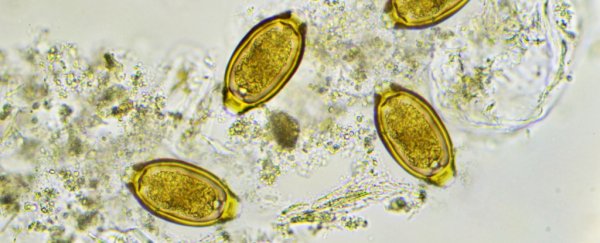Most of us find parasites desperately gross, even though 60 percent of humans are currently playing host to at least one. And some people are even willing to ingest parasites knowingly, as a supplement.
Now, for the first time in Europe, German authorities are evaluating whether one such supplement, containing eggs from a pig parasite, should be legally sold in the country as a… food product.
We typically associate parasites with diseases, but as with every complex biological relationship, the interactions evolved between us and the organisms that feed on us are not entirely clear-cut.
Researchers have found several interesting effects - for example, there is evidence that roundworms might be making some women in Bolivia more fertile.
And because parasites naturally hijack our immune systems, scientists have been looking into their potential for treating inflammatory bowel disease (IBD), gluten intolerance, and even multiple sclerosis.
But all this research is still in its infancy, and right now we don't have any medically approved treatments that involve deliberately playing house with parasitic critters.
However, a lack of solid evidence has never stopped people looking for easy cures. If you're just desperate enough, you might consider swallowing parasite eggs in the hopes that the wrigglies hatching in your bowels will fix whatever you're suffering from.
This approach stems from the thinking that modern humans are living too 'cleanly', and that some of our health issues prevail because we don't have enough exposure to the parasitic organisms we've been coexisting with for millennia.
And that's exactly the reasoning behind the worm egg supplement currently under review by Germany's Federal Office of Consumer Protection and Food Safety. The Thai company Tanawisa already had their product approved in Thailand in 2012, and have now applied to get it into the European market.
The worm in question is the pig whipworm (Trichuris suis), a relative of the same human parasite that causes trichuriasis. Because the pig parasite is adapted for life in its own host animal, its effect on humans is much milder as it can't really survive in our guts for very long.
And because of its application status as a "food or food ingredient", the whipworm egg supplement doesn't even need to be proven to work - it only needs to be proven to be safe to humans.
So if Germany does go ahead and allow the sales of pig parasite eggs to be mixed into people's morning smoothies, it still won't make this supplement any more evidence-based than it is now.
"In my opinion, worm therapies belong in the same category of pseudoscience cult therapies as chelation therapy for autism," Peter Hotez from Baylor College of Medicine told Andy Coghlan at New Scientist.
Where there's a will, there's a way, of course. A recent survey showed that there are probably about 6,000-7,000 people in the world self-treating their diseases with intestinal worms acquired online.
"It is readily apparent from a substantial number of anecdotes that self-treatment with helminths is effective for many people, probably even most people, in terms of alleviating a wide variety of inflammatory-related diseases," the study concluded.
But not everyone is so optimistic, and your doctor would probably frown at any such attempts, too.
"Self-medication with any type of worm is not recommended and it is important to remember they're not in any way completely harmless," Helena Helmby from the London School of Hygiene and Tropical Medicine told New Scientist.
"[They] may cause quite severe side effects if not monitored very carefully by a doctor."
